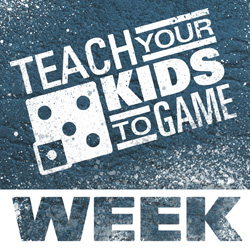Teach your kids to game week started yesterday. By now you have surely seen posts from various blogs, social media networks, and forums mentioning this occasion. This is the second year for the event that was started by DriveThruRPG.com. DriveThru has a product page up with several options to help you get started with teaching your kids to game.
I am most familiar with Argyle and Crew written by Ben Gerber and published by Troll in the Corner. But there are several more options there, some free for download. The list also includes rpgKids which always seems to get positive comments on Twitter.
Kids and Gaming in Practice
My two kids both game and both started at an early age. Games can be anything from RPGs, to Uno, to Carcassonne, to Zombie Dice, and more. Given this is primarily an RPG blog, I will focus on on the RPG aspect of gaming.
My older son got his start with playing a loose form of D&D minis several years back. This quickly evolved into actual RPG gaming. His first experience was with the D&D 3.5 Starter Box which as a little hit or miss.
A little later I introduced him to my own simplified Pathfinder game. By simplified I mean I chose his feats and skills after asking him how he pictured his character. Using that feedback I helped build him a character to fit that image. This worked pretty well and the interest was sparked.
Eventually his sister became interested and we did the similar thing with her. She’d describe what kind of hero she wanted to play and I built it for her. We handled more of the dice rolls from her, but she had a good time playing.
Later on the Pathfinder Beginner Box was released and we switched from my heavily modified Pathfinder for kids rules and went to that product. We had great success with this and within a short period of time my son was running his own games for his sister and I (and doing a good job!).
From there my son has played a couple of different systems. Over Thanksgiving weekend I introduced him to larger group gaming with a Dungeon Crawl Classics RPG one-shot and this past weekend he helped me playtest a module I am working on. He is quite the budding gamer!
Benefits
If you are reading this blog you are most likely an RPG gamer. Sometimes it is easy to get caught up in our own gaming and forget to spread the hobby around a bit. You would be surprised at how young a kid can be and start to pick up the gaming bug. I’ve had my son playing since about the age of 5 or 6. His sister has been playing since just before she was 5 (admittedly, she does it more to be social than love for the game at the moment).
Gaming is a great way to be creative and to tear the kids away from the screentime of television or computers. It is sometimes a gateway to them wanting to learn more about areas of history or technology.
Beyond all of that, it is a wonderful way to spend time with your family. It is moments like these that will really count for your kids or even kids in your extended family. I know I am guilty of sometimes spending too much time writing or prepping for a campaign. Take a moment to breathe and share the gaming bug with your kids or your nieces and nephews. They will be moments they will always remember and it will help grow their world.



